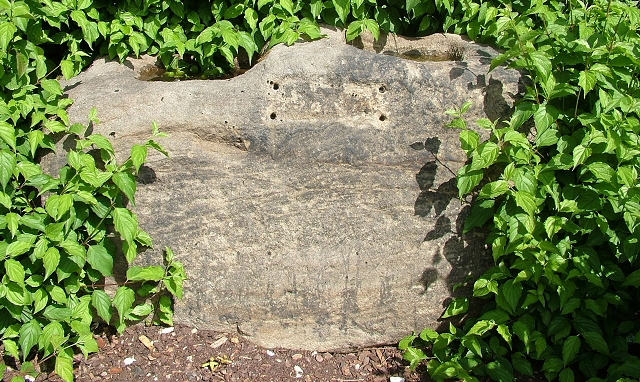Glacial erratics are rocks that differ from the type of rock native to the area in which they are found, carried by glacial ice often over large distances.[1] Erratics can range in size from pebbles to large boulders, and take their name from the Latin word errare, meaning to wander.
Examples
- The Great Stone in Stretford
 Grade II listed structure in Stretford, Greater Manchester, probably the base of an Anglo-Saxon cross shaft., on the south side of the Roman road from Manchester to Chester, is a glacial erratic that was used as a medieval boundary cross and is thought to have been used as a plague stone
Grade II listed structure in Stretford, Greater Manchester, probably the base of an Anglo-Saxon cross shaft., on the south side of the Roman road from Manchester to Chester, is a glacial erratic that was used as a medieval boundary cross and is thought to have been used as a plague stone Hollowed out stones or boulders containing vinegar to disinfect coins, usually placed at or near parish boundaries, relics of medieval plagues..[2]
Hollowed out stones or boulders containing vinegar to disinfect coins, usually placed at or near parish boundaries, relics of medieval plagues..[2] - The Great Stone of Fourstones, at the county border between North Yorkshire and Lancashire,[1] has fifteen steps carved in its side to enable it to be climbed.
- The Norber erratics in the Yorkshire Dales near Austwick are among England’s finest sets of glacial erratics.[1] More than a hundred sandstone and slate boulders were deposited on the limestone slopes of Ingleborough by glaciers that melted at the end of the last ice age between 12,000 and17,000 years ago. The erratics are scattered on the hillside, the slate boulders at higher levels than the sandstone. The softer limestone beneath them has eroded into the plinths on which they are balanced.[3]
- Shap granite from Cumbria has been found in Goldsborough Carr in County Durham, 40 kilometres (25 mi) east of where it originated. It is also found in North Yorkshire and on the Yorkshire Coast at Bridlington.[1]
- Humberston in Lincolnshire takes its name from ‘the stone by the River Humber’, a bluestone or glacial erratic that was recorded in the 11th century. In 1634, Gervase Holles described the “Humberstone’ as ‘a great Boundry blew Stone just at the place where Humber looseth himselfe in ye German Ocean”.[4][a]The German Ocean is the old name for the North Sea
Notes
| a | The German Ocean is the old name for the North Sea |
|---|
References
Works cited
{4928910:NA97JCIS};{4928910:ZENRDP76};{4928910:MRCDJSNX};{4928910:E389UNH7}
modern-language-association
creator
asc
1
0
24089

